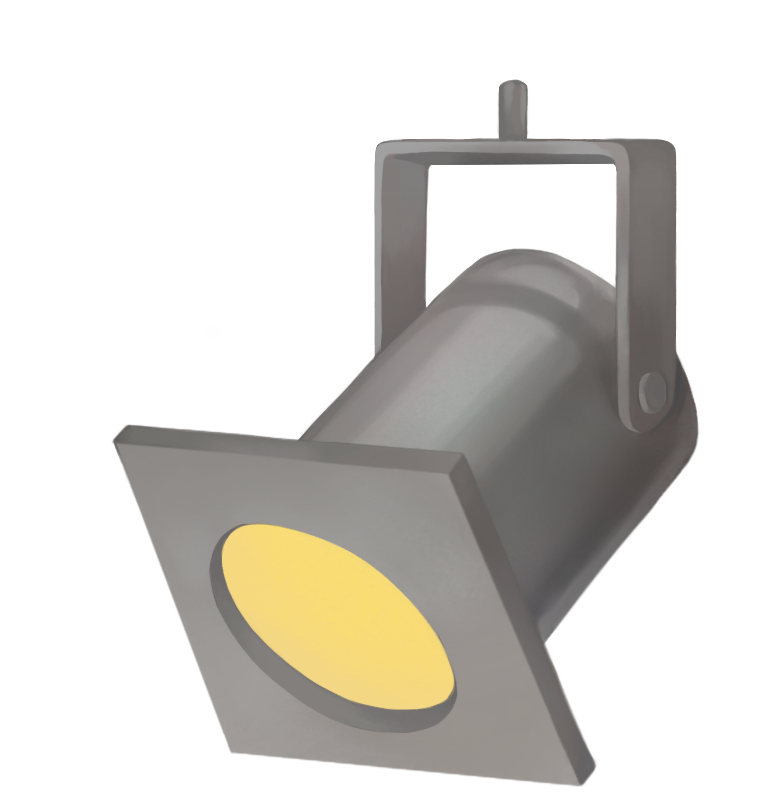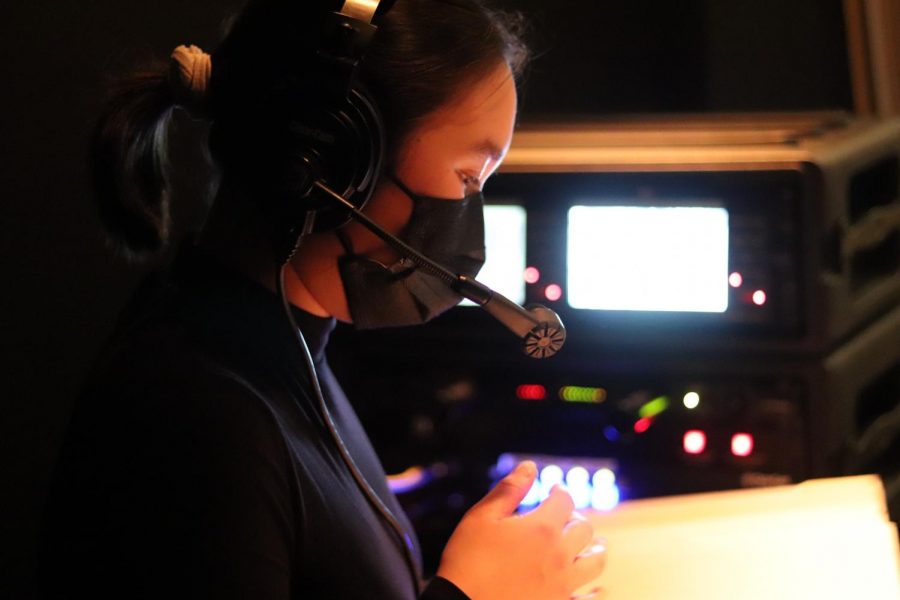From the Shadows
Junior and Stage Manager Katel Fong views her script as she performs a com check, making sure the other stage technicians are able to hear her directions
It is 7:30 p.m. on a Friday. As the last stragglers arrive, a chime echoes through the theater, encouraging the audience members to take their seats. The lights go dark. An eerie silence fills the room as an actor tiptoes onto stage.
Suddenly, a crisp beam of light slices through the theater and illuminates the actor. Behind the source of light sits a mysterious figure cloaked in all black, focused intently on keeping up with the actor moving across the stage to ensure that they remain illuminated at all times.
This cloaked figure is joined by more as they adjust lighting and sound and move backdrops across the stage, wowing the audience. Within each of Palo Alto High School’s dazzling theater productions, there is a talented group of students hiding behind the scenes.
Stage Tech is an eighth period class, meaning the class takes place after school has ended. Despite this deviation from the other electives Paly offers, Stage Tech fulfills CTE credit.
“When you look at the CTE standards, Stage Tech has performing arts because you have to be able to interpret scripts and narrative,” Paly’s theater teacher, Sara Thermond, said. “It has visual arts, because so many of the design areas are visual. And it has what CTE calls production management, which is the organization of people to make a live event happen. So it covers a lot of different interests.”
Since Stage Tech is able to sustain many people’s interests, it continues to attract new students to the elective. During these classes, students gain a professional-level knowledge of working behind the scenes in theater.
“It’s a lot of experience,” freshman Rocco Ferrante said. “I feel like it is a lot more valuable, rather than just doing [in-class] worksheets [for other classes]. You’re getting the experience of doing the job, and getting help from people that have done the job.”
The productions are almost entirely run by the students; Thermond takes a back seat as the students practice leadership and other skills needed in the theatre industry. With the help of two student leads for each department, students divide the work between teams in the beginning of the year.

The roles assigned range from sound, lighting, hair and makeup, costumes, props, set design, stage management and backstage scenery moving assistant.
“I offer artistic guidance… but a lot of it just comes from [the students] working together to get things done,” Thermond said. “The older students letting the younger students know where things are, and then bringing in those adult experts to offer another opinion as well.”
As older students help the incoming one, the class slowly integrates into a community.
“I hope that I can help people who are new to Paly Theatre feel welcomed into our community, regardless of prior experience or connections,” Stage Manager Katel Fong said. “I don’t want our group to feel exclusive.”
As the stage manager, Fong connects the on-stage actors to the behind-the-stage technicians. Her responsibilities include establishing solid communication between the director and the tech elements.
“With all of the other people working tech, the [stage manager] is calling standby for every set change, every [object] flying in and out of the stage, every sound cue, every light cue,” Thermond said. “Think of them as the conductor of an orchestra.” Fong’s duties as a stage manager include creating live cues for the various technical departments, such as the sound operator and light board operator.
“I personally do it because I genuinely find it fun—I like having a very involved role in the show, and I also like organization and communication,” Fong said.
Fong began participating in Stage Tech her freshman year, and during her junior year she eventually was offered the position as the stage manager. Being a stage manager comes with more responsibilities, reflected in the years of experience required to obtain the position.
In general, being a stage technician is not devoid of challenges. For example, due to the hectic schedules of tech week and rehearsals, technicians stay at school until 9 or 10 p.m. During tech week, rehearsals last all day; actors should have lines memorized so that technicians can run the rehearsals smoothly.
“It’s easy for the amount of tasks and the heavy time commitment to become overwhelming,” Fong said.
Another obstacle faced by those in Stage Tech was that the pandemic affected the ability to collaborate with each other. Over the course of the pandemic, Thermond was presented with a challenge when putting together productions for Paly theater over zoom.
“There was a lot of designing that happens when you’re doing a full on production on a stage… that you can’t really find the equivalent of [when doing a production over zoom],” Thermond said.
For the stage technicians, the task of managing lighting and building backdrops had to be improvised. The pandemic hindered many of these valuable experiences as people were confined to their homes.
“There’s only so much you can do about the lighting in a person’s room in their house,” Thermond said. “And we had to come up with some workabouts for sound.”
To bring back the interactivity during the months spent online, Thermond set up Zoom lectures to help educate theater staff on design and building sets. Guest speakers from professional theater backgrounds were brought in to discuss their work and offer their expertise to students.

“We had miniature lectures prepared on all of the major areas of design and the jobs contained within,” Thermond said.
As theater students returned to in-person school in the spring, they were thrilled to begin producing shows again. One of these elaborate productions, “Illusion,” took place in the beginning of November 2021 and covered the story of a prophesying magician in a 17th century setting.
“The characters are entertaining and often relatable and beneath the laughter, the story hints at a few serious undertones,” Fong said.
The show was put on with minimal problems due to weeks of preparation refining the performance. The process of crafting a show starts 10-12 weeks before opening night, when technical roles are distributed and characters are assigned. The many hours spent together help strengthen the theater community around their central goal and create a unique environment for creative individuals.
“It’s an interesting intersection of people who enjoy the performing arts and who also enjoy visual and audio production,” Thermond said. “It lets them merge that in a collaborative setting.”
Overall, the gratifying feeling of completing a production is unrivaled and as a stage manager, Fong enjoys the process of a production coming together.
“I enjoy the satisfaction of working really hard on something and having it pay off in the end,” Fong said.
However, many students involved in the theater program notice that the Paly community often takes theater at face value, only noticing the performances and forgetting that someone had to create a foundation for the talented actors to utilize.
“I feel as though we are held to a lower standard because we are considered an arts department, as opposed to STEM or sports,” Fong said.
Their talents are often unappreciated due to the lack of awareness surrounding the importance of their responsibilities in building the performance. Just in our Paly community, many may be unaware of what the roles of stage technicians are.
“I think that they are an integral part of theatre production and a lot of the time they are overlooked,” junior Grace Li said. “Most of the time the media covers the actors and the directors, but not any of the stage hands, set designers.”
Stage Tech is often seen as a lesser elective, which many technicians say undermines the efforts that they put into their craft. Although they work in the shadows, many people say their talents should be appreciated for what they contribute to the production.
“I wish others understood the amount of passion, time and dedication that goes into stage tech,” Fong said. “I want people to respect the effort of stage technicians the same way we do sports players.”
[ngg src=”galleries” ids=”12″ display=”basic_slideshow” arrows=”1″]Art by Carrie Lohse

2021-2022 - Staff Writer
2022-2023 - Online Managing Editor
C Mag was really appealing to me because of its creativity and beautiful designs. I remember...

2020-2021 - Staff Writer
2021-2022 - Staff Writer
2022-2023 - Managing Editor
I joined C Mag because of the focus on arts and representing our...

2021-2022 - Staff Writer
I joined C Mag because I have long been fascinated by the magazine's focus on combining elements and commentary of society's...


